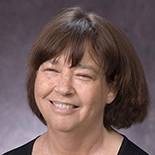Colleen Callahan regularly teaches Macroeconomic Theory (Economics 501), a required course in the master’s program. She has been a professor at American University since the fall of 2001.
Professor Callahan also teaches undergraduate courses in macroeconomics as well as a master’s course in financial economics. Her research centers on U.S. monetary history in the 19th and early 20th centuries. She received a BA degree from Miami University in Oxford, OH and a PhD from the University of North Carolina at Chapel Hill. Before coming to American University, Professor Callahan taught at Lehigh University in Bethlehem, PA and Occidental College in Los Angeles, Calif. She was honored with the 2010 Jonathan Hughes Prize for Excellence in Teaching Economic History from the Economic History Association. She will be teaching ECON-601 Macroeconomic Theory.
Get to know Colleen and learn more about her experience.
[MUSIC PLAYING]
COLLEEN CALLAHAN: Yeah to me, economics is macroeconomics. That's the part of economics that I really love and not every economist feels that way, but that's how I feel. Macroeconomics is the most exciting area for me. And I guess in particular what I like is the role that policymakers play in making macroeconomic policy decisions. And whether it's a central bank or a government, they all face a complicated set of trade offs between the political interest and the economic interests, and I like to watch and see how that gets resolved.
So when I first went to college, I thought I would be a math major. And then a year later, I thought it would be a political science major. And then I decided a year after that that would really fit both my interest was economics, and so economics used math. It complemented the issues in political science, and that turned out to be just a perfect decision for me. I wasn't an economics major, but I did end up going to grad school.
Yeah, so I am specialized really in monetary history and in some other aspects of economic history, and so I typically bring in historical examples that maybe reach back to-- what-- the late 18th century. So I love exposing students to the past, especially in small doses. I don't want to teach a course in economic history to you. I want to teach you macroeconomics, but we can find examples throughout the last more than 200 years to profitably use in our class.
Yeah, probably one of my greatest joys in teaching is being able to meet a wide variety of people of different ages. So I enjoy teaching my first year students as much as I enjoy teaching the juniors as much as I enjoy teaching master's students. So I'm happy at all levels of teaching macroeconomics, and it also is the case that I end up learning a lot from my students.
So sometimes professors say that, and it may or may not be happening. But for me it really happens. I listen carefully to what students have to say, and I end up learning a lot about the world from their comments.
Learn more about our accomplished MA in Economics faculty members. Call 855-725-7614 to speak to one of our admissions representatives or request more information.




